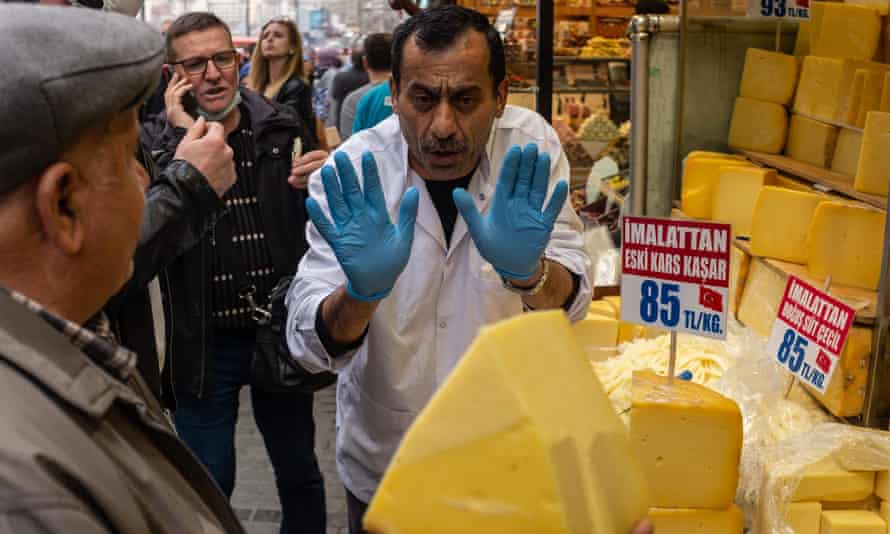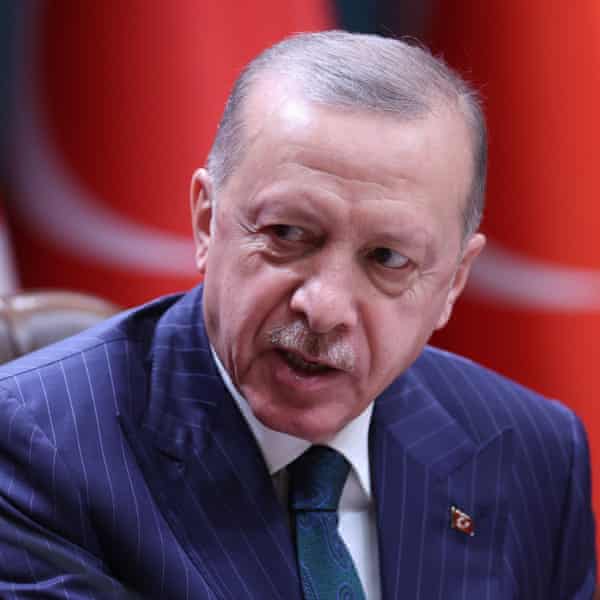Turkey’s war with inflation: ‘Prices change daily and everyone is scared’
From behind the counter in a bakery in Kasımpaşa, a working-class Istanbul neighbourhood, Mustafa Kafadar can see the orange, white and blue banners of Recep Tayyip Erdoğan’s Justice and Development party (AKP) as they blow in the spring breeze.
Kafadar has been wrenched out of retirement by Turkey’s economic crisis – his pension is no longer enough to cover his basic expenses. Now he works shifts in the bakery, where he describes living from payday to payday while he sweeps crumbs off a tray.
“Everything’s very expensive. After I buy my essentials and pay my bills, there’s nothing left,” he says.
Asked who is responsible, he chuckles darkly. “You know who makes inflation high,” he says cryptically, reluctant to voice his opinion of Erdoğan’s economic policies directly. “Not me, not you, not someone on the street – but who?” Kafadar has requested that his name be changed for his safety.
Turkey is weathering an unprecedented financial crisis. After the lira lost half its value last year alone, the country is now struggling with rocketing inflation, officially 61.14%.
Kafadar arranges rows of delicate breakfast pastries – fluffy round açma filled with olives or chocolate, börek and glossy poğaça buns – as customers arrive. He tells me they sometimes fly into a rage with him about prices. Jars of pink and white sugared almonds and an entire counter of elegant layer cakes, decorated with fruit and chocolate, sit untouched, now a little too pricey for most.
“Sugar and wheat prices have gone up. A kilogram bag of flour was 110 lira [£6.15] back in January; now it’s 220 lira,” he says. Pointing at some of the cheapest buns, he adds: “We couldn’t make the prices of the poğaças any higher, as people can’t afford it.”
When Turkey’s official inflation rate broke 50% in February, it represented both a two-decade high and a huge political problem for the government. The finance minister, Nureddin Nebati, insisted earlier this month that the surge was “temporary”, while Erdoğan recently vowed to protect Turks against inflation.
“As the Turkish economy is getting ready to become one of the world’s top 10 economies, we have said that we will not waste this opportunity with careless and thoughtless steps,” he said. “We will get out of this situation in a way that will not crush our citizens with inflation.”

Spiralling inflation is tied to the government’s efforts to radically overhaul the Turkish economy, keeping interest rates low in the belief that this will stimulate it and increase production – against the advice of most experts. There have also been frequent changes in key personnel at the central bank – Turkey has now had four central bank chiefs in three years.
“Yes, everyone is experiencing inflation worldwide, but Turkey is experiencing it at almost four or five times the rate of others,” says Alp Erinç Yeldan, an economist at Istanbul’s Kadir Has University.
“This is after a series of policy mistakes and ambitious expansionary projects, including following an economic policy that evades the rules of gravity.”
The inflation rate has become a political issue in itself: In January, Erdoğan fired the head of TÜİK, the country’s official statistics agency, angry that official inflation data for last year showed a record high. The independent economic research group Enag, which monitors Turkey’s inflation rate using the same metrics as the government, calculates real inflation was 142.63% in March. “One hundred and forty-two per cent is hyperinflation, no doubt about it.” says Yeldan. Since rising prices began to bite last September, Enag’s calculations of real inflation have consistently been double the official rate, he adds.
Turkey’s financial crisis has been further compounded by Russia’s invasion of Ukraine, which has driven up global food prices, particularly for wheat. The lira’s slide against the dollar was already affecting Turkey’s ability to import wheat, but the loss of Ukrainian supplies has left it scrambling to find alternatives, including dipping into its own reserves.
‘I paid a 1,000 lira electricity bill in February, just for these two machines,” says Mehmet Aslan, pointing at two refrigerators holding cured meat, cheese and plump yellow rounds of butter from the town of Rize, where his family comes from (as does Erdoğan’s). Last Ramadan, Aslan says his shop was bringing in 6,000-7,000 lira a day in sales; this year he’s lucky if it breaks 1,500 lira.
“People are making up prices,” he adds, pointing to a large jar of honey. “I could just make that 400 lira [£21] and no one would say anything. I could even make it 500.”

Still, Aslan is reluctant to blame the government for the current state of affairs. “Inflation is now out of control of the government,” he says. “I’m not happy with prices. I blame the population – it’s beyond Erdoğan’s control and everyone’s trying to bring him down.”
Turkey’s efforts to find a diplomatic solution to the war in Ukraine – catapulting Erdoğan back on to the world stage as a statesman rather than an aspiring autocrat – has helped deflect some of the criticism. His personal approval rating rose in March to 43.3%, while the AKP’s share of the vote increased by 3%, according to polling organisation Metropoll.
Yet polls have also shown that more than half – 53.6% – of Turkish citizens were only just managing to meet basic needs last May, while a quarter said they couldn’t cover their essential costs. Earlier this year, delivery and supermarket workers staged prolonged strikes to demand wage increases in line with inflation.
Energy costs in Turkey began to rise at the beginning of this year, but, as with the price of wheat, Russia’s invasion of Ukraine has sent them soaring. Turkey imports about a third of its gas from Russia. The state-owned pipeline operator Botas said this month that the price of gas for electricity generation would rise by almost 45%, with a 50% rise in prices for industry and 35% for households.
As prices rose, Kemal Kılıçdaroğlu, the leader of the opposition Republican People’s party (CHP), declared on camera that he would not pay his own electricity bill until Erdoğan brought prices down. AKP officials labelled this “a provocation”.
Ordinary Turks remain “preoccupied with the economy”, says Ekrem Cunedioğlu, an economist with the opposition İyi party. It is hoping to persuade the Turkish public that it can fix the economy as elections, which are due by or before 2023, start to loom. “What we see from the data is rising deep poverty, meaning income not meeting basic needs. Inflation might reduce next year but deepening poverty will prove tougher to solve.”
Pınar Duru, who runs a boutique bakery in Istanbul’s wealthy Cihangir neighbourhood, says she has started baking bread only to order and opening her shop at reduced times in order to save energy costs.
“From October on, inflation began hitting hard,” she says. “I make brioche, and the price of everything, eggs, flour, sugar, butter … suddenly increased. It’s still doing so, on a daily basis – one day I check the price of eggs, and the next day it’s different.”
Turkey’s efforts to find a solution in Ukraine, and potentially bring down food prices in the process, bring little solace, Duru adds. “It brings me no comfort or distraction – I live with the prices in my regular life, and my friends do too. Yes we talk about the war, but right now all we talk about is inflation,” she says. Prices are changing on a daily basis and everyone is scared for their future, she adds. “Unless I see the dollar go down, I’m not going to feel comfortable or secure.”




